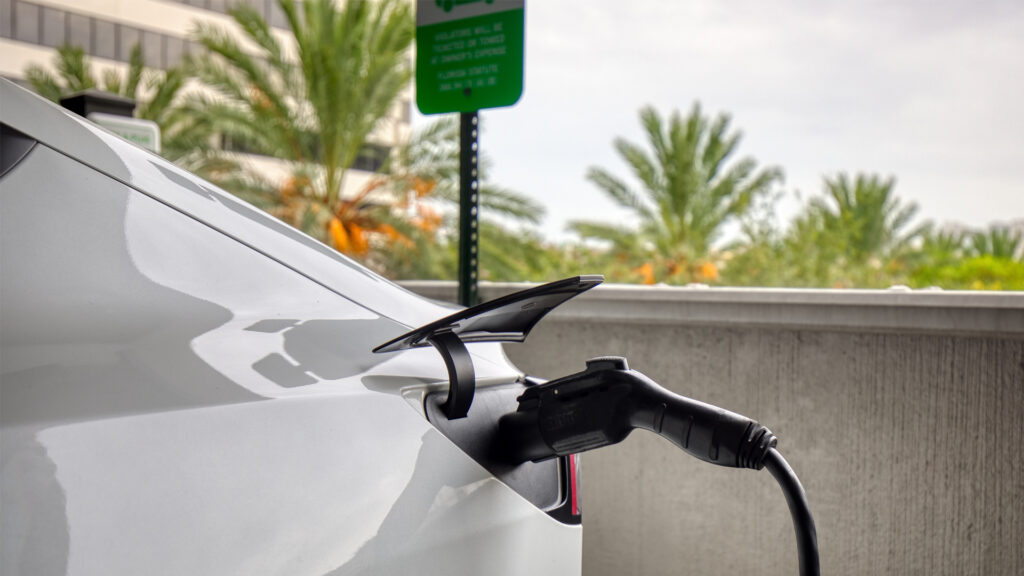By Mary Linn, Electrification Coalition
Most Floridians keep an eye on our spending. We scour ads for sales; we shop the buy-one, get-one deals at Publix; and we make sure to get our kids’ school supplies during sales tax holidays. However, members of the Florida Legislature are now proposing energy legislation that would block taxpayer savings, create more government red tape and threaten American security by making us even more dependent on foreign oil and gas.
A proposed omnibus energy bill (Senate Bill 1624 by Sen. Jay Collins and House Bill 1645 by Rep. Bobby Payne) would eliminate fuel efficiency considerations for state vehicles and establish cumbersome barriers for adding fuel-saving electric vehicles (EVs) to our state fleets.
While EVs have historically had higher purchase prices, they have much lower fuel and maintenance costs — and that means evaluating the cost over their full life cycle will bring Florida long-term savings. Incentives are also available under the Inflation Reduction Act, significantly reducing the upfront cost of buying electric vehicles.

Electrifying state and local government fleets can dramatically reduce expenditures for fuel and maintenance. By transitioning to electric fleets as fossil fuel vehicles are retired, state and local governments can save significant amounts of money for taxpayers.
An internal combustion engine vehicle uses gas or diesel fuel, requiring such complex mechanical components as pistons, valves and crankshafts. Many of us have experienced that “How much is this going to cost me?” moment when the check engine light comes on in our internal combustion vehicle. However, when the total cost of ownership — including purchase or lease price, maintenance, repair and resale value — is considered during procurement, long-term financial savings are achieved when the vehicle is an EV. Total cost calculations help support fleet managers’ needs to consider the all-inclusive cost of vehicles, from their purchase price to vehicle maintenance and operation.
Maintenance costs of EVs are three times lower than for gas vehicles in the first three years alone. By considering these factors and working to procure more electric vehicles, Florida can save taxpayers $277 million over 15 years, according to an Electrification Coalition analysis.
Additionally, this legislation risks imposing financial burdens on Floridians through a mandate for the state to self-insure against hurricanes, potentially prepaying billions for events yet to occur. Such a requirement could unjustly hike utility rates, granting utilities unchecked power to spend heavily at the expense of residents. As we advocate for cost-effective transportation solutions, we must equally resist fiscal policies that threaten our economic well-being.
So why is the Florida Legislature building speed bumps to slow electric vehicle adoption? Last year, lawmakers approved SB 284, a total cost of ownership bill, with bipartisan support. The bill would have required the Florida Department of Management Service (DMS) to use the total cost of ownership criteria in state fleet vehicle procurement, but the proposal was ultimately vetoed by Gov. Ron DeSantis.

This year, SB 1624 and HB 1645 propose to eliminate fuel efficiency criteria. Instead of making it easier to drive electric vehicles, lawmakers are adding cumbersome and duplicative legislation.
What if the Department of Children and Families in Tampa wanted to buy electric cars for caseworkers to do site visits? DCF would need to check with DMS, which would then need to make sure the vehicle is on a newly created Florida Humane Preferred Energy Products List established in conjunction with the Department of Commerce and the Department of Agriculture and Consumer Services. An alphabet soup of state agencies standing in the way of savings! To make it worse, Florida already has an approval list, but the Legislature wants to remove the existing list and create a new one.
While Florida residents once hauled citrus crops to river wharves via horse-drawn wagons, we now need the state of Florida to also look at the future of transportation. Cost and vehicle efficiency should be part of the criteria we use in 2024 for our state.
From Key West to Pensacola Beach, all of Florida should apply the total cost analysis for vehicle procurement. With major auto manufacturers committing to shifting their new vehicle fleets to EVs over the next decade, it is time for Florida to join the modern age.
Mary Linn serves as a campaign organizer for the Electrification Coalition.
If you are interested in submitting an opinion piece to The Invading Sea, email Editor Nathan Crabbe at ncrabbe@fau.edu. Sign up for The Invading Sea newsletter by visiting here.




It’s about time somebody called out our state legislators on their anti-climate bills! EV’s are not a “woke” issue–good economically, and good for the environment!
Tom Caffery, Orlando